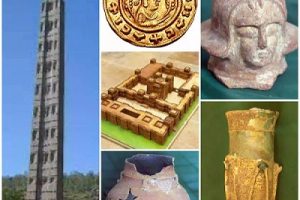
BY EYUEL KIFLU
The 82nd Ethiopian Victory Day was celebrated last week in Addis Ababa under the theme “for solidarity, endurance, and victory”. It was marked in the presence of President Sahle-Work Zewde and other government officials, as well as patriotic fathers. The day is celebrated every year on May 5th (Miyazeya 27) to commemorate the defeat of fascist Italian forces by Ethiopian patriot fighters in 1941, ending the five-year-long Italian occupation of the country.
The day honors the sacrifices made by Ethiopian freedom fighters that fought for their country’s independence, cultural identity, and sovereignty. It also serves as a reminder of the country’s resilience, firm resistance against oppression, and valor to uphold national unity.
Italy had a desire for territorial expansion and empire-building. Italian leader Benito Mussolini wanted to avenge Italy’s loss to Ethiopia in the First Italo-Ethiopian War in 1896(Victory of Adwa) and increase Roma’s influence in Africa. Additionally, Italy believed that Ethiopia was a weak and vulnerable nation that could easily be conquered, and saw the conquest of Ethiopia as a way to restore national pride and boost Italy’s standing as a world power. However, the Ethiopian patriotic fathers not only showed their bravery on the battlefield; they also repeated the victory in the diplomatic method. Ethiopia’s diplomatic relations played a crucial role in the victory, which commemorates the defeat of Italian forces in Ethiopia in 1941.
Diplomatic efforts by Ethiopia’s allies, including the United Kingdom and the United States, also helped secure vital military support and supplies for the Ethiopian army during the conflict. In addition, the country’s diplomatic engagement helped garner international support and sympathy for its struggle against colonialism and inspired other anti-colonial movements across Africa.
The victory and the role of diplomatic relations in securing it also helped cement the country’s reputation as a symbol of African resistance and independence. When Italian forces invaded Ethiopia in 1935, Emperor Haile Selassie led the resistance and was forced to flee the country after the Italians took control. However, Emperor Haile Selassie played a crucial role in the victory against the Italian invaders. He led the resistance against the Italian forces, both politically and militarily, and his bravery and inspiration inspired Ethiopians to fight against the invaders. He also successfully sought international support for his country’s cause, which ultimately led to Italy’s defeat and the country’s independence.
Emperor Haile Selassie’s leadership and determination played a significant role in Ethiopia’s successful resistance and ultimate victory. He did not give up his fight for Ethiopia’s independence and instead took his case to the League of Nations, where he made a famous speech in which he pleaded for the international community to stand up against aggression and to protect the sovereignty of smaller nations. His speech received international attention and support, and he was able to secure various forms of aid from other countries, including arms and ammunition.
He also worked to rally Ethiopian patriots to continue their fight against the Italian occupiers, and he provided strategic guidance and support to his army as they fought against the better-equipped Italian forces. In 1941, the combined efforts of Ethiopian patriots and international supporting forces led to the liberation of Ethiopia from Italian occupation. Emperor Haile Selassie returned to his homeland and was hailed as a hero by his people. His diplomatic efforts and leadership played a crucial role in the resistance against Italian aggression, as well as the eventual victory of the Ethiopian Patriots.
Despite this, Italy’s use of chemical weapons and other atrocities during the conflict was widely condemned by the international community and led to Italy’s isolation on the world stage. This event is arguably seen as a prelude to World War II, as it highlighted the aggressiveness of fascist regimes and the ineffectiveness of the League of Nations in dealing with these aggressions.
And the step for Ethiopia on the international stage was to bring some sanctions to Italy’s attention. In response to Ethiopian appeals, the League of Nations condemned the Italian invasion in 1935 and voted to impose economic sanctions on the aggressor. The sanctions remained ineffective because of a general lack of support.
So, Ethiopian Victory Day is a celebration of bravery and resilience in the face of adversity. The victory of the Ethiopian patriots against Italian colonization was a significant moment in the country’s history. This day reminds us of the sacrifices made by our ancestors to protect our country’s sovereignty, dignity, and freedom. It is a celebration of national pride and unity, urging us to uphold Ethiopia’s values and traditions. The Ethiopian Patriots’ Victory Day represents our strong spirit and unyielding determination to overcome all challenges. Therefore, it is imperative that we commemorate this day and preserve its significance for future generations.
Despite this, following the end of World War II, Ethiopia, and Italy signed a peace treaty in 1947 that recognized Ethiopia’s independence. Ethiopia also established formal diplomatic relations with Italy in 1948, which have continued to this day. Ethiopian-Italian diplomatic relations date back to the late 19th century, when Italy established a protectorate over the Ethiopian Empire in 1889. However, Ethiopian-Italian relations have not always been positive, with Italy’s invasion of Ethiopia in 1935–36 remains a contentious issue. In recent years, the two countries have worked to strengthen their diplomatic ties, with a focus on trade and investment. Italy is one of Ethiopia’s largest trading partners, with Italian companies operating in various sectors such as energy, construction, and transportation.
Additionally, Italy provides development aid to Ethiopia in areas such as healthcare, education, and agriculture. Overall, while there have been challenges in the past, Ethiopian-Italian relations are currently positive and centered on mutual economic benefit and diplomatic cooperation.
In a similar vein, Ethiopia continued the process of resolving problems through diplomatic means rather than hostile approaches. For the sake of peace, the country has maintained its firm stand in using diplomatic means to resolve any dispute with other countries least to mention its recent border conflict with Sudan.
In fact, since time immemorial, Ethiopia has been a linchpin in echoing African voices on many frontiers. The country has been a frontrunner in climate diplomacy and in fending off external intervention. With Addis Ababa being a diplomatic hub, Ethiopia’s diplomatic clout remains as strong as before.
The Ethiopian Herald May 11/2023





